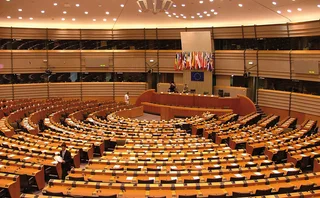
An international platform
With government encouragement, insurers are operating out of Ireland and selling across the EU. The country's regulator is now making significant contributions to Solvency II. Nicholas Dunbar reports

Life & Pensions
How did Ireland's financial services industry change from being domestically to internationally focused?
Aidan Carrigan, Finance Ministry
We've always been quite clear that we're competing for business in Ireland to establish it as a financial centre. The record of the financial centre has been built on the basis of developing a core of skilled workers, the attractive tax rate, the international business language, and developing a certain centre of excellence with transferable skills that would allow it to build the industry. In the early 1990s, I was involved in certifying the financial industry to come here. They had to show a commitment to the centre, which meant employment and a substantive presence here. As part of that they got the benefit of the attractive tax basis rate. That is how the centre was built. It went through difficult times in the early days and, more recently, has taken off to become a very important part of our economy. The government is very committed to the financial services sector as a substantive part of our future plans for the economy. The question is how do we sustain that? Obviously, we have an attractive tax rate. In addition to that, the government has worked very hard to develop a partnership with financial services. They have set up structures for collaborating with industry to deal with potential issues as they arise on a partnership basis. To support that, we have a clearing house group that draws together all the public sector agencies and all the industry, the legal firms and the accounting firms. We work together with them to identify the key requirements to developing the business and the industry, and to make sure that industry and government have the right environment to develop financial services. Within that, there is an insurance sub-group that has those same principles of working closely to develop the insurance industry, and to reflect the emerging issues and how they can be addressed.
Life & Pensions
How has the regulatory structure in Ireland evolved to keep pace with these developments?
Patrick Brady, Financial Regulator
Insurance supervision was only brought within the control of the Financial Regulator in May 2003. Up to then, it had been in the civil service department where the same unit was responsible for authorisation, consumer issues and supervision. When we took it here there were about 23 people in the insurance area. The complement for 2008 is 43 and that is just on the prudential side. There has been a radical change in Ireland's approach to insurance supervision from what was there up until 2003. The biggest change was prompted by an IMF report from 2000; one of the financial sector assessment programmes that they carried out here. Essentially, they were concerned about the absence of on-site supervision. That was possibly the biggest change we made. There was a relatively light regulatory regime in place at the time, whereas now we have increased the focus of on-site scrutiny. We have regular review meetings with all of the companies. We have pulled all of the reinsurer companies in that wanted to be supervised and authorised, so we now have 116 reinsurers subject to full regulatory control. It's changed radically - it's a different place.
Life & Pensions
In terms of the quantitative supervision and requirements for companies with regard to capital, have there been any radical changes there since 2003?
Patrick Brady
The solvency requirements in Ireland are higher than most jurisdictions in that we require a minimum of 150% of the EU minimum. The 150% solvency requirement is possibly a consequence of the relatively light regime that was already in place. We don't operate a rules-based approach like the UK, for example. The 1994 regulations governing solvency are essentially the rules. We have a principles-based approach to regulation. It really focuses on governance, internal control, proper risk management, protection of policyholders and so forth. The regulatory regime we operate is twofold - one is on the quantitative side where we get in quarterly or annual returns depending on the nature of the company. As we move forward that will be quarterly reporting for everybody. Then, on the qualitative side, there are the annual review meetings with senior management where we sit down with the vast majority of companies on an annual basis and discuss strategy for the coming year and how they've performed in the previous year. We generally have the CEO, CFO and actuary at those meetings, which can last from a day to half-a-day. Then, there are the more intensive, on-site examinations that can take three-to-five days - we take our own actuaries and risk assessment people and that kind of thing. On an on-site visit, there could be four or five people forming a dedicated inspection team and they would be supported by an actuary, somebody from the financial analysis unit, and possibly a couple of desk officers as well. There can be eight-to-ten people on site, depending on what's being discussed at the time.
Life & Pensions
What kind of sanctions have you imposed on insurance companies?
Patrick Brady
The legislation giving us power to introduce sanctions was only passed in 2004. I'm not aware of any formal public sanctions in the insurance sector yet. However, there are sanctions outside of the formal administrative sanctions regime. We have told certain companies over the years to stop writing new business, because we thought that their capital was beginning to dwindle or they were writing business too quickly. In such cases, there may be no regulatory breach, but our own qualitative assessment leads us to make low or medium-level recommendations.
Life & Pensions
As the insurance industry in Ireland becomes more internationally focused, how important are cross-border regulatory relationships to your work?
Aidan Carrigan
We're a small, open economy with respect to all aspects of our industry, including financial services. We couldn't survive on a purely Irish market. The size of the industry requires international markets to grow. Our strategy is based on developing Ireland as a location for international financial service trading across Europe. We deal with contacts across Europe through the European structures, which are quite comprehensive - the solvency groups, the EIOPC group and, at the higher level, co-ordinating groups at financial services level. There is very little bilateral engagement at government-to-government level, except with double-taxation agreements, which would take you outside the European context.
Life & Pensions
Some insurance groups have based entities in Ireland and have used them to sell products via branches in other EU countries. This has created some concern, particularly in Germany, and there have been suggestions about using consumer protection or market conduct regulation to restrict this activity.
Patrick Brady
From my perspective, we clearly have responsibility for the prudential regulation of these companies. That is where our responsibility stops in terms of the ones that are writing business on a freedom of service (FOS) basis. When they write in FOS they are subject to domestic consumer protection legislation and, within the insurance arena, we have the Siena protocol that all the member states have signed up to. So long as the local consumer protection rules are not designed in such a way as to be protectionist or to discriminate against business that's been provided either on a branch or FOS basis, it's not an issue for me.
Life & Pensions
Has there been any regulator-to-regulator dialogue about this? Have you encountered any debate?
Patrick Brady
I haven't encountered any kind of debate. Clearly, there are some member states that would rather see the business provided domestically than on an FOS basis. I get some complaints from Irish companies finding it difficult in some markets. The most obvious one would be selling into Germany. I have some companies who are trying to sell to Germany and they are at a distinct competitive disadvantage because only domiciled German insurers have access to the German winding-up/guarantee system. FOS companies are not allowed access and there is an ongoing discussion with industry, me and the European Commission on that.
Life & Pensions
This is the insurance guarantee fund in Germany?
Patrick Brady
It's called an insurance guarantee fund. My understanding is that if a company gets into trouble, those policies are taken over by a form of company that continues to run the policies. You have to be a domiciled German insurer to access that scheme. Unfortunately, German brokers are, anecdotally, saying to some of our clients 'this particular company does not have access to this scheme'. Essentially, only German policies are being sold. I would rather see the scheme open up to anybody who is selling policies there because it's a scheme to protect policyholders not insurers. I don't see why one German policyholder should be discriminated against over another as a consequence of the policy coming from a different insurer.
Life & Pensions
It could be that a distinction is made between the type of guarantee offered by Irish insurers and the guarantees offered by traditional domestic German providers. BaFin's Thomas Steffen suggested (Life & Pensions, May 2007, p6) that the Irish variable annuity guarantee was not as strong as the traditional German one. He seemed to think that the solution might be more transparency from Dublin.
Patrick Brady
In terms of the guarantee, with variable annuity or GMXB products, they clearly set out the part of the product that is unit-linked and the part of the product that captures the nature of the guarantee that the policyholder wishes to go for, and the risks associated with that element of the guaranteed business. The policy documentation is fairly clear on that. I'm not sure that increasing transparency regarding solvency would add anything to the current directive. Given that we require one and a half times that, be it for guaranteed or non-guaranteed business, we're still requiring a higher solvency than any other regulator in Europe.
Life & Pensions
But the statutory technical provisions are lower in Ireland.
Patrick Brady
There's no doubt about that. If you go to a range of jurisdictions, their requirements for technical provisions are extremely onerous - ours are not, but they're still more onerous than is set out in the directive. We do have rules for admissible assets but our technical provisions are less onerous than a lot of jurisdictions, I won't deny that. To me, the directive is quite clear in terms of best estimate and so forth - it's the old argument of those who go for the prudent person, then the prudent person 'plus', and the prudent person 'plus plus'. We'd be on the prudent person end of the scale, rather than the 'plus plus' end of the scale.
Life & Pensions
Does it worry you that these variable annuity providers are quite leveraged in terms of some of the assumptions they're making?
Patrick Brady
Clearly it's a new business operating from this jurisdiction, and even in Europe GMXBs are only very recent phenomena. In terms of absolute oversight of it, I'm not saying it worries me but it's something that I would clearly pay attention to and that I would expect the companies to pay attention to. In terms of their GMXB business, I would expect to be going through with them on an annual basis in terms of how they have priced it, how they have reserved for it, and how they are assessing the performance of it. Where companies are doing GMXB business, it would always be high on my agenda.
Life & Pensions
Given the complexity of these new products, there are concerns that your department is under resourced, especially in terms of actuarial skills.
Patrick Brady
There are several issues there. One is that until fairly recently we would have had two fully qualified actuaries and two who have almost finished their exams. One of the qualified ones has just left unfortunately, but we have another one on the way very shortly. Another issue is that we don't regulate products. Again, maybe some jurisdictions do, but the directive is quite clear that we are not allowed to regulate products. The second point is that in the life business there is also the appointed actuary who operates independently of the company and is subject not only to the guidance notes of the Society of Actuaries, but also the rules governing the ethics of appointed actuaries - that is the second control. From a third control aspect, although we don't regulate products in the context of the variable annuity business, we do assess in great detail how the business is being done, how it's being reserved, and how they break out the guaranteed from the non-guaranteed element. Interestingly, we haven't had a failure of a life or non-life company here. Show me another jurisdiction that can say that. Some of them encounter this a lot and they are possibly some of the most regulated jurisdictions. They possibly have a staff complement ten times the size of mine - so I'm not sure the complaint stands up to scrutiny.
Life & Pensions
There has also been innovation in Ireland on the available capital side. Here I'm thinking of how the Bank of Ireland gained a capital benefit with the value-in-force securitisation of its life business.
Patrick Brady
They didn't securitise the life business. We have to be careful of the language that we use because pure securitisations in life are only a developing phenomenon. Certainly, I only know six or seven that have been done globally. The policies stayed on the life book, the policyholders are there, and we continue to supervise the insurance company. It will still comply with the minimum 150% solvency requirement. What the Bank of Ireland did was issue a performance bond that promised investors a return based on performance of the value in-force business. It's almost like a derivative of a securitisation.
Life & Pensions
You have had an important Solvency II role in your capacity as chair of the CEIOPS sub-committee on insurance groups. How is the relationship with the European Commission and how successful have you been at getting consensus in a politically charged area?
Patrick Brady
The Commission has a role to play, but if you look at the particular line that some of the Commission have adopted, it was out of synch not only with what supervisors were saying, but also with what was happening at Level 2 - 12 countries have signed a letter essentially objecting to the group support regime - and it was certainly out of synch with Peter Skinner's draft report from Parliament. You have the Commission saying one thing and then you have the supervisors, Council and Parliament saying something else. I spent some time talking to the Chief Risk Officers Forum and they're reasonable happy - they have looked at the advice and what we've said about co-operation, co-ordination and sharing of information. Their biggest issue was about this derogation provided for in the directive from Article 136 - enforcement by local supervisors. Even the industry recognises that there was some ambiguity around that which really needed to be clarified. We just point to the fact that what the directive provides for is extremely unclear; that the industry has interpreted it in a narrow sense and that if supervisors were to interpret it in the same narrow sense it wouldn't be so much of a problem. It's going well. In the numbers game, I have more people on board from the supervisory perspective than there are in Council.
Life & Pensions
Given your experience, and Ireland's degree of cross-border business, what do you think about the issue of third country equivalence in Solvency II?
Patrick Brady
We've learnt a lot on the reinsurance front - we possibly have more experience than most on that. Currently, equivalence isn't such a big issue. Within the context of Solvency II, it will be a significant issue, particularly with regards to groups. If you read through the theory of the directive, any parent consolidating in Europe will benefit from global consolidation and, therefore, global diversification. The issue then arises not so much on equivalence but whether they are using capital outside of Europe to support the group's commitment. There are three independent issues: there's the transferability, the fungibility and the liquidity of that piece of capital. When equivalence comes in - if the capital is in the US entity, for example - is that capital available under US solvency rules as support? There will be two levels of equivalence: there will be the lower level, which would have to satisfy availability of capital rules, and then there would be the more global issue of if, say, Canada were to import and adopt the Solvency II regime, could they operate - for subsidiaries based in Europe - minimum capital requirement (MCR) where the capital is in Canada? That's where equivalence will really come into play. Will we recognise equivalence by way of the Canadian supervised regime so that an Irish-Canadian subsidiary would only run at its MCR with a commitment covering the solvency capital requirement (SCR). That's really the big equivalence test. Currently, if you look under the Solvency I regime, there is relative equivalence of solvency in a lot of jurisdictions. Solvency II is a totally different space. It's not only the Pillar I aspects that you would have to satisfy yourselves with, but Pillars II and III also. It will be a challenge without a shadow of a doubt.
Life & Pensions
The status of the group supervisor suggests that local supervisors will effectively be able to outsource internal model approval to that host supervisor.
Patrick Brady
To a certain extent, yes. If you look at the co-operation and co-ordination arrangements that we've set out for colleges of supervisors, that element of trust has to come into it. You have to trust the group supervisor to make the right call, although all the supervisors in the college are involved in making the call. However, at a local level the solo supervisor still has to satisfy us that the local people can run the model - that they have the data to support the model and that they know how it works. It really isn't a case of 'there's the model, you have to accept it'. When I say the local people, I'm not just talking about the local supervisor, but I have to satisfy myself that the people working in the local subsidiary also know how to run the model and that they understand the model. Although model approval is at group supervisor level, use of the model has to be satisfied at a local level.
Life & Pensions
The debate over the MCR is also contentious. Do you think that the compact approach, supported by the UK and the EU Parliament's Peter Skinner, will be adopted?
Patrick Brady
Putting my neck on the line here, I don't think it will go as a percentage of the SCR. I wouldn't like to see that. If you look at the original Commission proposal and what the MCR was designed for, and then look at the purpose of the SCR and the Solvency II regime, which is risk based, it would be counter-intuitive to have to establish what your SCR is before you can establish what your MCR is. My preference would be to keep it simple and have it as a margin over technical provisions. I'm trying to make life easy for companies as well. Companies know the minimum levels of capital they have to operate on and supervisors know that if it goes below this they need to make sure they have enough money to run off the company. Hopefully it will never come to that, but it's the level of comfort that supervisors want. If you have it based on a percentage of the SCR, depending on whether you go from a 99.5% to 90% or 80% percentile - if 99.5% is a one-in-two hundred year event, then 80% is one-in-five years. That means you will breach the MCR once every five years. That's scary territory for me as a supervisor. I'm sure it's scary territory from a company's perspective as well. I think we have to make sure the MCR is as the Commission wanted it to be in their first publication, simple and robust - the emphasis being on robust.
Life & Pensions
I understand you are moving on from chairing the groups sub-committee and will now do financial conglomerates. Do you have any advice for the new chairperson?
Patrick Brady
I encourage participation. It's important that everybody expresses their view, but having said that we always come to a conclusion at the end of each point. My experience with the Commission and particularly in Council, and I'm talking about the Insurance Groups Committee, is that you would go to a meeting where three or four people speak and the rest stay silent. You think we have an agreement, and when you go to the next meeting five other countries put their hands up and disagree with everything that was said previously. I have a rule in my committees - silence means ascent. At the end of every conclusion, a conclusion is given. If you stay silent, you agree with that conclusion. People are encouraged to take part for that very reason. They have to express a view and they have to support that view. I would suggest that whoever takes over from me continues that.
Only users who have a paid subscription or are part of a corporate subscription are able to print or copy content.
To access these options, along with all other subscription benefits, please contact info@risk.net or view our subscription options here: http://subscriptions.risk.net/subscribe
You are currently unable to print this content. Please contact info@risk.net to find out more.
You are currently unable to copy this content. Please contact info@risk.net to find out more.
Copyright Infopro Digital Limited. All rights reserved.
You may share this content using our article tools. Printing this content is for the sole use of the Authorised User (named subscriber), as outlined in our terms and conditions - https://www.infopro-insight.com/terms-conditions/insight-subscriptions/
If you would like to purchase additional rights please email info@risk.net
Copyright Infopro Digital Limited. All rights reserved.
You may share this content using our article tools. Copying this content is for the sole use of the Authorised User (named subscriber), as outlined in our terms and conditions - https://www.infopro-insight.com/terms-conditions/insight-subscriptions/
If you would like to purchase additional rights please email info@risk.net
More on Solvency II
Lack of transposition to delay Mifid II enforcement
Some states won’t have adopted directive before June, making rule-imposition difficult, say lawyers
Capital and funding
Quants propose KVA and FVA accounting framework based on Solvency II regulation
Testing interest rate models for Solvency II applications
Alexey Botvinnik and Vladimir Ostrovski propose a validation method for interest rate models
Eiopa cuts matching adjustment risk margin
UK insurers welcome additional capital relief
Solvency II volatility dampener ineffective for euro periphery
Stress tests expose flaw in formula to calculate volatility adjustment
Solvency II technical draft too harsh, firms claim
Industry representatives call on Eiopa to soften draft specifications
Commission 'must ensure proportionality of Solvency II' rules as MEPs give green light to new regime
Omnibus II approved by European Parliament
EC to restrict deferred tax assets in Solvency II
Rules expected to be tightened on determination of future profits
Most read
- Breaking out of the cells: banks’ long goodbye to spreadsheets
- Too soon to say good riddance to banks’ public enemy number one
- Industry calls for major rethink of Basel III rules







